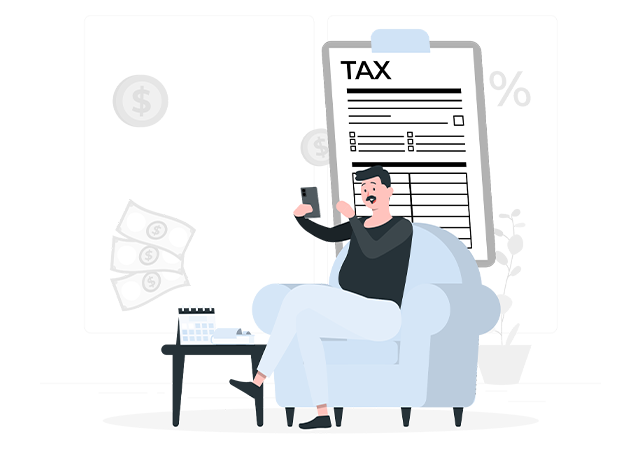Businesses and professionals (sole proprietorships, partnerships, LLPs, or companies) must file an income tax return if their income exceeds the basic exemption limit or if they are required to file under provisions of the Income Tax Act, 1961.

About Income Tax for Business
Setting up a business and understanding the complexities of filing returns is essential to running a business. A business tax filing is an income tax return filing applicable to companies. It serves as a comprehensive record of the business’s earnings and expenses.
Who should file a Business Income Tax Return?
Filing a business income tax return is mandatory for all eligible businesses operating within the framework of Indian tax regulations. The need to do a business tax return filing is contingent upon the structure of the business:
- Sole Proprietorship
- Partnership Firm
- Limited Liability Partnership (LLP)
- Companies – Private Limited Company, One Person Company
Types of Business Income Tax Return Filing
The different categories for filing business income tax returns are determined based on the types of business entities allowed to submit them. These categories correspond to other business structures and their respective designations. Ensure to follow the guidelines designed for how to file taxes for small business owners.
- Proprietorship Tax Return Filing
- Partnership Firm Tax Return Filing
- Limited Liability Partnership Tax Return Filing
- Company Tax Return Filing

Proprietorship Tax Return Filing :
Any individual with business income is said to be operating a proprietorship firm. Proprietorships operating in India are required to file income tax returns each year. Since proprietorships are considered the same as proprietors, a proprietorship’s income tax return filing procedure is similar to individual income tax return filing.
All proprietors below 60 years are required to file income tax returns if total income exceeds Rs. 2.5 lakhs. For proprietors over 60 years but below 80 years, income tax
filing is mandatory if total income exceeds Rs.3 lakhs. Proprietors over 80 years and above must file income tax returns if the total income exceeds Rs.5 lakhs.


All partnership firms must file ITR for business income, regardless of income or loss. Partnership firms are taxed as a separate legal entity under the Income Tax Act. Hence, the income tax rate applicable for partnership firms is similar to that of LLPs and companies registered in India
Most partnership firms’ income tax return due date is July 31 of the assessment year. Partnership firms required to get their accounts audited under the Income Tax Act must file the income tax return before the October 31st


Partnership firms are required to file income tax returns in form ITR 5. Like all other income tax forms, ITR 5 is an attachment-less form, and there is no requirement for submitting any documents or statements along with a partnership firm tax return. However, the taxpayer must save all records about the business and produce the same before tax authorities when requested.
All LLPs are required to file an income tax return, irrespective of the amount of income or loss. LLPs are a separate legal entity and are taxed separately from the Partners of the LLP. The income tax rate applicable for LLPs is similar to companies registered in India.


All LLPs are required to file income tax returns each year, irrespective of income or loss. If there was no business activity, then a NIL income tax return must be filed before the due date.
All companies registered in India are required to file income tax returns each year. Under the Income Tax Act, company tax return filing falls under two categories, namely domestic company or foreign company. Companies registered with the Ministry of Corporate Affairs, like Private Limited, Personal, or Limited Companies, are classified as domestic companies.
All companies registered under the Companies Act 2013 or the earlier Companies Act 1956 should file ITR 6 Form. However, if the company’s source of income comes from the property held for religious or charitable purposes, it is not required to file the ITR 6 Form.


All companies registered in India must do business tax return filing yearly, irrespective of income, profit, or loss. Hence, even dormant companies with no transactions are required to file income tax returns each year.
The due date for the return filing of domestic companies for is 31st October


The ITR-3 is applicable for individual and HUF who have income from profits and gains from business or profession. One can call it a master Form, as this is the one form where an individual or HUF can report all the possible incomes.
Who can file ITR-3 Form?
-
Carrying on a business or profession (both tax audit and non-audit cases)
-
The return may include income from house property, salary/pension, capital gains and income from other sources.
-
Remuneration received from a partnership firm
Who is not eligible to file ITR-3 Form?
-
No persons other than individuals & HUF are eligible to file ITR-3 Form.
-
Individuals & HUFs not having income by way of business or profession or partnership firm are not eligible to file the ITR-3 Form.
For non-audit cases, the due date to file ITR-3 is 31st July and for accounts requiring audit, the due date is 31st October.


The current ITR-4 applies to individuals and HUFs, Partnership firms (other than LLPs), which are residents and whose total income includes:
-
Business income according to the presumptive income scheme under section 44AD or 44AE
-
Professional income according to presumptive income scheme under section 44ADA
-
Income from salary or pension up to Rs 50 lakh
-
Income from one house property, not more than Rs 50 lakh (excluding the amount of brought forward loss or loss to be carried forward)
-
Income from other sources having income not more than Rs 50 lakh (excluding income from lottery and race-horses)
Please note that any individual earning income from the above-mentioned sources as a freelancer can also opt for a presumptive scheme if their gross receipts are not more than Rs 50 lakhs.
A presumptive income scheme under sections 44AD, 44AE and 44ADA is when an individual or an entity opts to derive its income on a presumptive basis, i.e. when the income is presumed at a minimum rate based on a percentage of gross receipts / gross turnover or based on ownership of commercial vehicles. However, if the business turnover exceeds Rs 2 crore, the taxpayer will have to file ITR-3.
-
If your total income exceeds Rs 50 lakh
-
Having income from more than one house property
-
Owning any foreign asset
-
If you have signing authority in any account located outside India
-
Having income from any source outside India
-
If you are a Director in a company
-
If you have had investments in unlisted equity shares at any time during the financial year
-
Being a resident not ordinarily resident (RNOR) and non-resident
-
Having foreign income
-
If you are assessable in respect of the income of another person in respect of which tax is deducted in the hands of the other person
-
If in case payment or deduction of tax has been deferred on ESOP
-
If you have any brought forward loss or loss needs to be carried forward under any income head

Frequently Asked Questions
-
Who needs to file an income tax return (ITR) for a business?
-
Do businesses need to get their accounts audited?
Yes, if the business turnover exceeds ₹1 crore in the case of a business or ₹50 lakh for a professional. The accounts must be audited by a qualified chartered accountant, and a Tax Audit Report (Form 3CA/3CB) must be filed along with the return.However, the threshold limit is Rs. 10 Crore in case up to 5% of the total gross receipts and payments are cash transactions.
-
How do I file an income tax return for my business?
Businesses must file their income tax return online through the Income Tax e filing portal. After filling in the details and uploading the necessary documents, the return is submitted electronically.
-
Can a business file a revised return?
Yes, businesses can file a revised return if they notice any errors or omissions in the original return. This must be done before the end of the assessment year or within 12 months from the end of the relevant financial year, whichever is earlier.
-
Can a business avail of a tax refund?
Yes, a business can avail of a tax refund if excess tax has been paid (e.g., excess TDS or advance tax). This can be claimed during the filing of the return, and the refund will be credited to the business’s bank account after processing.
-
What happens if I don’t pay the tax due?
If the business does not pay the tax due, it will attract interest under Section 234A for late payment. Additionally, penalties for underreporting or incorrect reporting may apply under Section 234F.
-
Can a business carry forward its losses?
Yes, a business can carry forward certain losses such as:
- Business losses can be carried forward and set off against future profits. Capital losses can be carried forward to offset capital gains in future years
